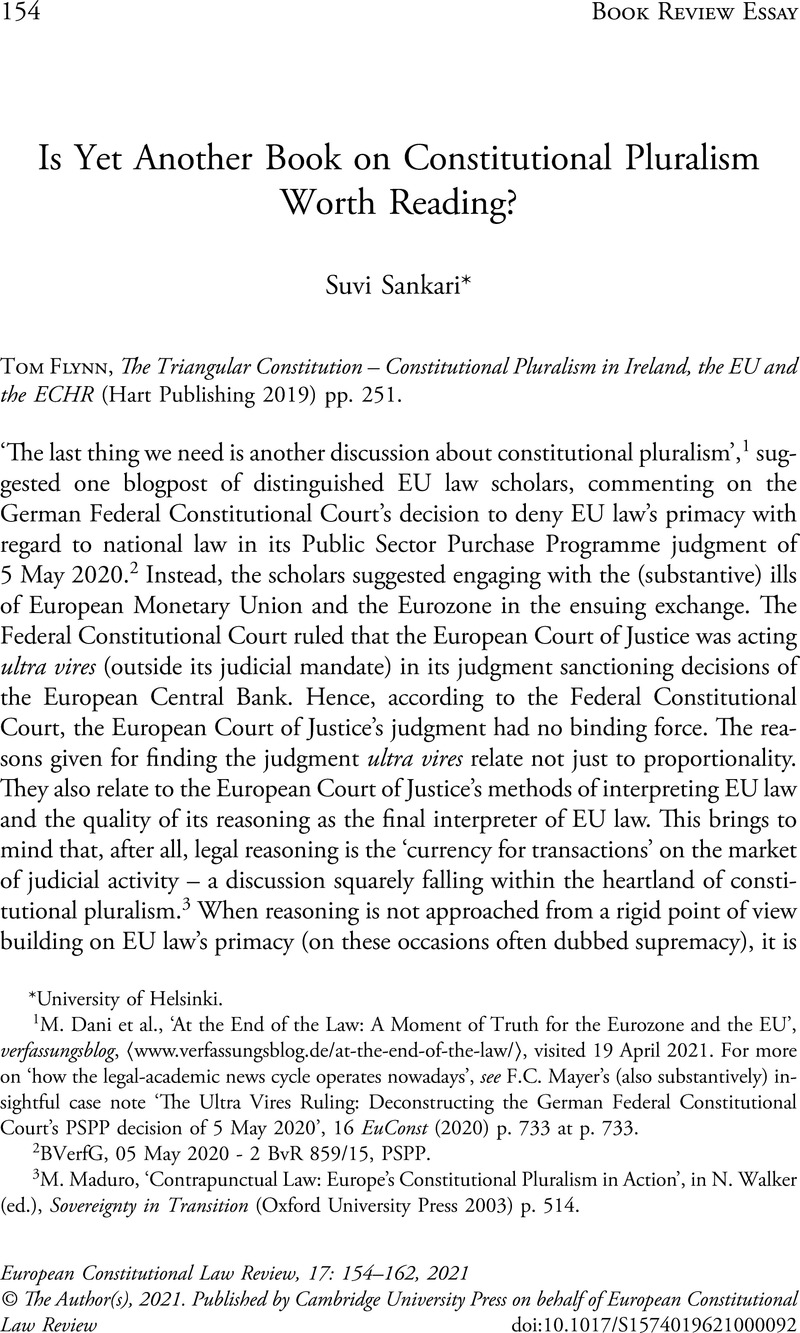No CrossRef data available.
Article contents
Is Yet Another Book on Constitutional Pluralism Worth Reading?
Review products
Published online by Cambridge University Press: 17 May 2021
Abstract

- Type
- Book Review Essay
- Information
- Copyright
- © The Author(s), 2021. Published by Cambridge University Press on behalf of European Constitutional Law Review
References
1 M. Dani et al., ‘At the End of the Law: A Moment of Truth for the Eurozone and the EU’, verfassungsblog, ⟨www.verfassungsblog.de/at-the-end-of-the-law/⟩, visited 19 April 2021. For more on ‘how the legal-academic news cycle operates nowadays’, see F.C. Mayer’s (also substantively) insightful case note ‘The Ultra Vires Ruling: Deconstructing the German Federal Constitutional Court’s PSPP decision of 5 May 2020’, 16 EuConst (2020) p. 733 at p. 733.
2 BVerfG, 05 May 2020 - 2 BvR 859/15, PSPP.
3 M. Maduro, ‘Contrapunctual Law: Europe’s Constitutional Pluralism in Action’, in N. Walker (ed.), Sovereignty in Transition (Oxford University Press 2003) p. 514.
4 The body of literature has grown far beyond one footnote. The ‘movement’ started with Neil MacCormick and was further developed by Neil Walker, Miguel Maduro, Mattias Kumm and others. For encompassing documentation of literature, see e.g., the book reviewed here, G. Davies and M. Avbelj (eds.), Research Handbook on Legal Pluralism and EU Law (Edward Elgar 2018), K. Jaklic, Constitutional Pluralism in the EU (Oxford University Press 2014).
5 C.F. Sabel and O. Gerstenberg, ‘Constitutionalising an Overlapping Consensus: The ECJ and the Emergence of a Coordinate Constitutional Order’, 16 European Law Journal (2010) p. 511 at p. 550. Incompletely theorised agreements can either denote an (explicit) agreement to disagree on the grounds for agreement or just agreeing but (not necessarily explicitly) on different grounds – Sabel and Gerstenberg build on the latter.
6 22 Human Rights Quarterly (2000) p. 603.
7 M. Kumm, ‘The Jurisprudence of Constitutional Conflict: Constitutional Supremacy in Europe Before and After the Constitutional Treaty’, 11 European Law Journal (2005) p. 262 at p. 299.
8 Kumm, supra n. 7, at p. 299.
9 Kumm, supra n. 7, at p. 290, fn. 70.
10 Kumm, supra n. 7, p. 300.
11 M. Poiares Maduro, ‘Three Claims of Constitutional Pluralism’, in M. Avbelj and J. Komárek (eds.), Constitutional Pluralism in the European Union and Beyond (Hart Publishing 2012) p. 70; M. Maduro, ‘In Search of a Meaning and Not in Search of the Meaning: Judicial Review and the Constitution in Times of Pluralism’, 2 Wisconsin Law Review (2013) p. 541.
12 J. Rawls, ‘The Idea of Overlapping Consensus’, 7 Oxford Journal of Legal Studies (1987) p. 1.
13 Sabel and Gerstenberg, supra n. 5.


